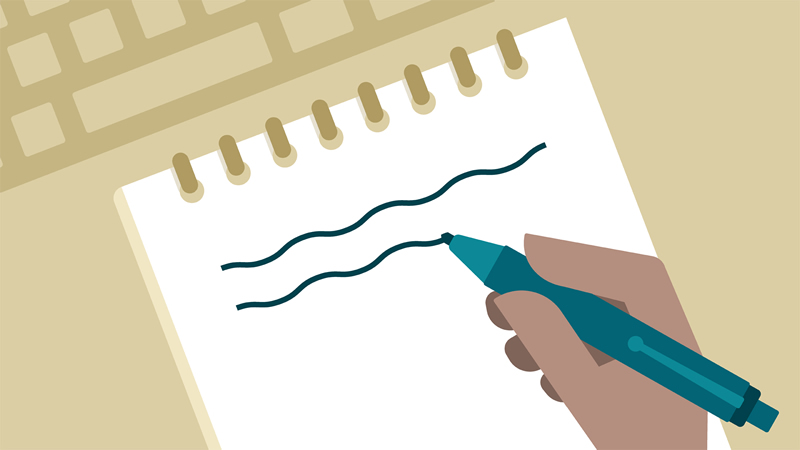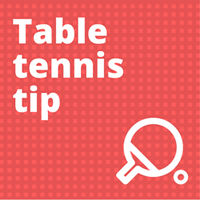
This week I beat an opponent who I lost to twice last season. This player was not a particularly strong opponent – his win percentage is quite low – but I have trouble with his playing style. He is quite steady, with good ball placement and very consistent. Nothing spectacular, but for some reason, I struggle with this type of player.
But this week, I won (hooray!). What was the main reason for my win? I have improved a little since last year, so this was certainly a factor. I was also generally playing well on match night. I wasn’t too tired (the two-year-old slept through the night) or stressed from worked, so this helped too.
But the biggest factor for my win, was my note-taking. Yes, that’s right, good old boring note-taking!
After my second loss last season, I made notes on the match. I analysed what went wrong, what went well, what tactics I could try next time and I wrote it all down. And before the match this week, I re-read my notes, paying special attention to the match tactics. I coached myself. And it worked, like it has many times before.
So in this blog post, I explain why I write notes about my opponents, what I include in my notes and why you should make notes too.
Benefit of writing notes about opponents
The above example is not a one-off. I regularly make notes about my opponents. I make notes about an opponent’s playing style, how I lost points, how I won points and what tactics to try the next time we play.
This has many benefits for me. It helps me develop my analytical thinking, my tactical thinking and it helps me identify any problem areas which I need to address.
For example, when I first started writing notes, this issue of returning serves kept coming up. I was leaking points because I struggled to return this serve or that serve. The note-taking made me confront this issue. I started to work on returning serves much more in my practice sessions, so I could improve this area of my game.
Processing defeats
Note-taking also helps me process defeats. If I have a bad loss, I can feel quite down about it. I sleep poorly and I can be quite grumpy the next day (and the day after!).
Making notes helps me move on and stay positive. I analyse the match and think through why I didn’t play well and identify different tactics I can try for the next time I play.
I find this provides some psychological relief. It stops me dwelling on a defeat. I have analysed it, identified what went wrong and I have developed a plan for the next match (more on this a bit later). Done. Finished. Over. Time to move on.
What do I include in my notes?
In my notes, I generally include details about an opponent’s playing style, details of what happens when we play, and a list of tactics to try for the next match. Each document is probably 250-500 words.
Here’s the example of the notes I made last season on the opponent I beat this week…
“I lost to this player twice in 2016-2017 season. He is very consistent, has very good placement and defends well with steady blocks. In our last game, he beat me quite comfortably. I didn’t play technically or tactically very well. Although it’s fair to say I do struggle with his playing style and he makes me play badly! I found it hard to attack consistently. I often found myself out of position and making weak shots, which allowed him to dominate.
Tactics for next time…
- His strengths are topspin rallies which are played at a medium speed. So I need to avoid playing this type of game with him.
- When receiving, I should try to be much more aggressive and force him back. This will give me easier balls and better angles for the rest of the rally. If I return too softly, he will dominate. Most of his serves are either light topspin or no spin, so there is plenty of opportunity to play faster returns. I may as well try to be aggressive. I may miss a few but if I can get 50%-60% good returns I’m going to win more points that doing softer returns.
- For my own serve, I should mix in more backspin serves, just to change the nature of the rallies. His pushing is fairly consistent too, but this may give you better opportunities to open with a strong attack. Also, he is very good at returning most serves. He doesn’t return with blistering pace, he just gets them all back. So I should just accept he will return my sidespin serves and focus instead on my positioning after serve to do a good 3rd ball attack.
- His backhand is better than his forehand, although his forehand is still consistent. You should play a bit more to his forehand, but keep trying to switch direction of play and put him under pressure with good placement.
- Finally, you need to have good technique when attacking. This means getting feet in right position and twisting when playing forehand. You have to attack with power, otherwise it is too easy of him to return.”
So you can see, the notes are nothing special. I’m not writing an award winning book. They just need to make sense to me.
You can write your notes in any form. You might want to write more detail or keep notes much simpler. It doesn’t really matter. You can make notes in whichever form that makes sense to you.
It is the process of making notes (developing your analytical and tactical thinking) which matters more than the format of the notes.
Preparing for the next match
The bit I find most helpful about note-taking is planning match tactics.
It may be several months before I face the same opponent again. If I don’t make notes, I tend to forget the detail of the previous encounter. So there is a danger that I will repeat the same tactical mistakes as last time.
But if I write notes and prepare tactics fresh from a match, I can use these as reminder before the next match.
So I was able to use my notes above before the match this week, even though I had written them months before.
What really won me the match was the tactic of playing more to his forehand. I wasn’t sure if the tactic was going to work. But I had a focus. I had something different to try. And it did work. I won the first two games comfortably.
In the third game, I eased off a bit. I stopped attacking so strongly and started playing to his backhand a bit more. I lost this game. I had deviated from the tactics I had planned in my notes.
But because the notes were fresh in my head, I was able to remind myself again to target the forehand and attack strongly. I did this and won the match.
It was my notes which made the difference.
Brain power
I’m a big fan of making notes on opponents. It doesn’t guarantee that you will turn a loss into a victory. But 90% of time, my notes help me perform better the next time I play the same opponent.
Note-taking is great for developing your analytical and tactical skills, which is just so, so, so helpful when playing matches. A player with good tactical skills, but less technical ability will often beat a player with good technique but poor tactical skills.
Your brain can be just as effective as your body in helping you win matches.
So use it!


